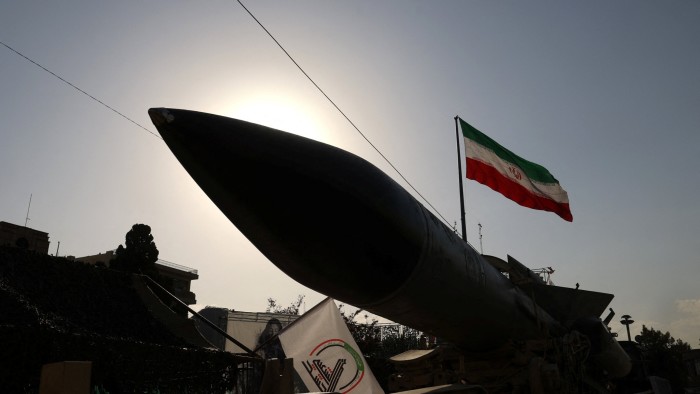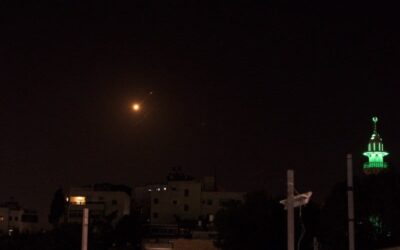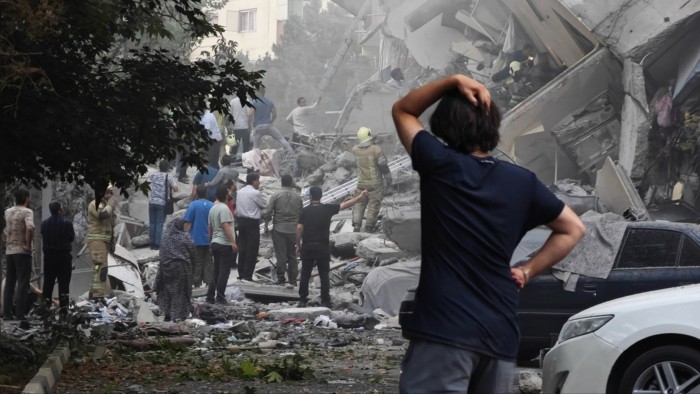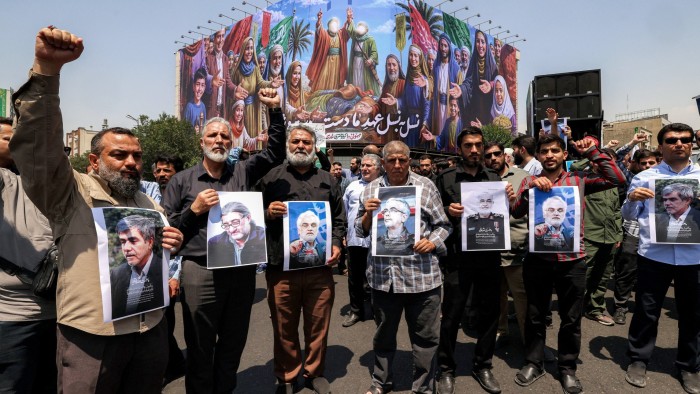Israel targets Iranian commanders and nuclear sites with air strikes

Unlock the Editor’s Digest for free
Roula Khalaf, Editor of the FT, selects her favourite stories in this weekly newsletter.
Israel has launched dozens of air strikes against Iran targeting its nuclear programme, military facilities and senior commanders in a large scale attack that pushed the Middle East closer to a renewed war.
Massive explosions were heard across Tehran at about 3.30am local time on Friday, and initial videos and photos shared by Iranians on social media showed smoke rising from various parts of Tehran.
Iranian state television said that Natanz, one of Iran’s two main nuclear plants, was struck and that several senior military and nuclear figures were killed in the strikes, including Major General Hossein Salami, head of the powerful Revolutionary Guards, Mohammad Mehdi Tehranchi, a prominent physics professor and Fereydoon Abbasi, a former head of Iran’s atomic organisation.
Their deaths were not officially confirmed. State television showed smoke rising from the main command headquarters of the Revolutionary Guards in eastern Tehran as well as Natanz, which is in central Iran.
Israeli Prime Minister Benjamin Netanyahu said Israel “struck at the heart of Iran’s nuclear enrichment programme”, saying it targeted its facility in Natanz and the republic’s “leading nuclear scientist”. Iranian state TV broadcast images showing thick black smoke rising from the site, which it said was struck around 4.15am.
An Israeli military official said dozens of strikes were launched, in what appeared to be the largest and deadliest attack by Israel against the Islamic republic.
The US said it was not involved in the strikes, which came days before the Trump administration was due to hold a sixth round of negotiations with Iran in an effort to resolve the nuclear crisis diplomatically.
US President Donald Trump said on Thursday that Washington was “fairly close to a pretty good agreement,” adding that he did not want Israel to attack Iran because it could “blow” the chances of deal.
However, he also said that: “Might help it, actually. But it also could blow it.”
Netanyahu said in a video statement that Iran was just “buying for time”.
“That is why we have no choice but to act and act now,” Netanyahu said.
Israel’s defence minister Israel Katz said Israel was expecting Iran to retaliate with “a missile and drone attack against the state of Israel and its civilian population . . . in the immediate future”.
Israel closed its airspace and banned most non-essential gatherings. Iran suspended all flights until further notice.
Iran has repeatedly warned it would retaliate against any attack, and reiterated this week that it could target US bases across the region.
US secretary of state Marco Rubio said in a statement Washington was “not involved in strikes against Iran and our top priority is protecting American forces in the region”.
“Israel advised us that they believe this action was necessary for its self-defence,” Rubio added. “Let me be clear: Iran should not target US interests or personnel.”
The White House did not respond to requests for comment about the attack. US Central Command, which oversees US forces in the Middle East, also did not respond.
Oil prices soared on the reports of the strikes, with international benchmark Brent up more than 5 per cent to $72.22 a barrel and US marker West Texas Intermediate rising by a similar margin to $71.24. Futures tracking Wall Street’s blue-chip S&P 500 index fell 1.3 per cent.
The strike follows a months-long stand-off over Iran’s nuclear programme as Tehran has for several years been enriching uranium close to weapons grade.
Both Israel and the US has vowed to prevent the republic developing nuclear weapons. Tehran insists its programme is for peaceful civilian purposes, but it has the capacity to produce sufficient fissile material required for a nuclear weapon in less than two weeks.
The UN atomic watchdog’s board on Thursday declared Iran was in breach of its non-proliferation obligations, the first such censure in two decades.
The strikes cap nearly two years of conflict across the Middle East that began with the war between Israel and Hamas triggered by the militant group’s October 7 2023 attack on Israel.
Last year, Iran and Israel twice exchanged direct missile and drone fire against each other, but those tit-for-tat assaults were contained.
Helima Croft, a former CIA analyst who is now at RBC Capital Markets, said a critical question was whether Iran would retaliate by targeting regional energy supplies.
“The fact that this strike occurred in advance of the Sunday nuclear talks between the US and Iran and after President Trump had publicly indicated that he wanted to give diplomacy a chance to run its course is remarkable,” she said.
Additional reporting by Jamie Smyth and Steff Chávez in New York




